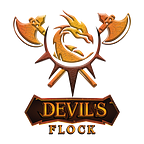The Rise of RPG Games on the Blockchain.
The blockchain games industry, also known as GameFi, has surged in popularity over the past few years and is expected to continue its growth in the coming years. So far, we’ve seen several successful projects introducing different gameplay mechanics into the space. We’ve seen trading cards, turn-based strategy, collectible card games, and roleplaying games.
RPGs have been around for a long time. They are one of the oldest genres of video games. From Rogue to Dragon Stumper and Pokemon to Final Fantasy, RPGs have always had their place in gaming history.
So, it’s only right that blockchain games should be able to take advantage of this genre. In fact, blockchain games have already started to do so with some great success stories.
In this article, we’ll cover what makes an RPG game tick, how they work, and why they’re the perfect crossover between the traditional gaming industry and the blockchain gaming industry.
What is an RPG Game?
An RPG (role-playing game) is a type of video game where players assume the roles of characters within fictional worlds. These worlds may be based on real-life or imaginary settings.
They can fight monsters, complete quests, explore dungeons, make friends, and save the day.
Players usually start at level 1 and gain experience points throughout the play. As these points accumulate, they will increase the player’s stats, making them stronger.
As you progress through the game, your character will grow more powerful, gaining new abilities and even leveling up. This allows you to advance further into the story and face greater challenges
How Does Blockchain Work With An RPG Game?
Blockchain technology works by creating a decentralized network of computers that process transactions via cryptography. Any central authority does not control it but relies on peer-to-peer networking.
This means that all data is stored across multiple nodes, meaning no single entity controls its access. But enough of the techy stuff — let’s get down to business!
We already know traditional games don’t offer any other incentive besides the thrill of the gameplay. This limits the players’ engagement because there isn’t much else to keep them playing.
But if we look at blockchain games, we see that they provide several incentives beyond just the gameplay itself.
For example, many blockchain games provide financial rewards for completing certain tasks. Some even allow users to trade items and services using cryptocurrency.
These features help incentivize players to engage with the game, which leads to higher retention rates and increased revenue.
Why Are Role Playing Games The Perfect Crossover Between Traditional And Blockchain Gaming?
Traditional games are fun, engaging, and exciting. However, they lack the extra value of blockchain games.
If we think about it, blockchain games are like a hybrid of both worlds. On the one hand, they offer the same gameplay mechanics as traditional games. On the other, they introduce additional features such as avatar ownership, economic incentives, and decentralization.
This combination provides gamers with the best of both worlds: the excitement of a traditional game combined with the added benefits of blockchain technology.
To get a first-hand view of blockchain gaming, check out our latest project, Devil’s Flock.
Devil’s Flock is a play-to-earn RPG where players can create their avatars and participate in PvP battles against each other.
In addition to the core gameplay, players can earn virtual currency by completing daily quests, hunting monsters, and trading goods.
Check out our website for more information about Devil’s Flock.
Here’s How To Stay Abreast And Also Participate
Twitter: https://twitter.com/DevilsFlock_io
Discord: https://discord.gg/6Ep5guftGY
Telegram: https://t.me/+lmnR_u4Lf2c0MTVk
Instagram: https://www.instagram.com/devilsflock.io/
